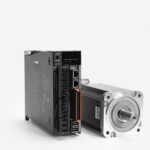Unlocking efficient motor control with resistors
Cranes are the backbone of industries like construction, manufacturing and logistics, where the lifting and precise placement of heavy loads are essential. Ensuring that cranes operate smoothly, safely and efficiently requires sophisticated motor control systems. Here, Mike Torbitt, managing director of resistor manufacturer, Cressall Resistors, explains the role that resistors can play in ensuring consistent, efficient crane control.

From erecting skyscrapers and loading cargo at ports to maintaining power plants and assembling aircraft, cranes are crucial for operations that require robust and reliable lifting solutions. As the construction industry continues building upwards — with 600 more skyscrapers in the pipeline for London alone — cranes will be key to realising future industry projects.
A crucial control system
At the heart of crane operations is a control system, which is responsible for managing the various movements and functions of the crane. These systems include both mechanical controls, like gears and pulleys, and electrical controls, such as motor drives and braking systems. The primary objective of a crane control system is to ensure that the crane operates efficiently and safely — whether that’s lifting a beam into place on a skyscraper or positioning a delicate component in a manufacturing process.
Motor control systems in cranes play a crucial role in managing the speed, torque and direction of the crane’s movements. They enable operators to have precise control over the crane’s actions, from the gentle lifting of a load to the exact positioning of materials.
Advanced control systems also include features for monitoring and adjusting performance in real-time, which helps to maintain the operational efficiency and safety of the crane. By integrating these controls, cranes can achieve higher productivity, reduced operational costs and improved safety.
The role of motors
Motors are the powerhouses behind the various functions of a crane, driving the mechanisms that lift, lower and move loads. In crane systems, motors are used to control different parts, including the hoist, trolley and the crane’s overall movement on its tracks or rails. Each motor’s performance must be precisely managed to ensure that the crane can handle heavy loads safely and efficiently. Several advanced motor control technologies are required to provide the necessary regulation and coordination for optimal crane operation.
Variable frequency drives (VFDs) are one critical component in crane motor control systems. They adjust the frequency of the electrical power supplied to the motors, allowing for precise control of motor speed and torque. This is essential for the smooth lifting and lowering of loads, as well as for finetuning the crane’s movements. By optimising motor performance, VFDs help reduce energy consumption and mechanical stress, extending the life of the crane’s components and enhancing overall efficiency.
Dynamic braking systems are another essential, allowing for rapid deceleration and stopping of the crane’s movements. This capability is critical for ensuring safety and preventing accidents, especially in emergency situations where quick response times are necessary. Dynamic braking systems help manage the kinetic energy generated by the crane’s movements, converting it into heat and dissipating it safely, which prevents potential hazards associated with uncontrolled load movement.
Resistor reliability
Resistors play a vital role in a crane’s dynamic braking system, by managing power dissipation and ensuring safe and efficient operations. In crane applications, resistors are used in various ways to enhance the performance and reliability of the control systems.
When a crane slows down or stops, the kinetic energy from the moving parts is converted into electrical energy, which needs to be dissipated to prevent damage or overheating. Resistors absorb this energy and convert it into heat, allowing for controlled and safe deceleration. This is crucial for maintaining the stability and safety of the crane, especially when handling heavy loads or during emergency stops.
Cressall Resistors is a leader in power resistor solutions, offers a range of products specifically designed for crane motor control systems. Its dynamic braking resistors are designed specifically for high-power applications, to operate efficiently in demanding and harsh environments often encountered in crane operations.
Motor control systems are the backbone of efficient, safe crane operations. By integrating these technologies, and the resistors that safeguard the systems, cranes can achieve superior performance, reliability and safety, elevating efficiency across many industries.







